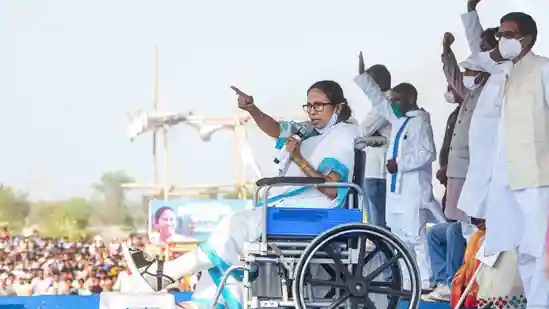Anil Singh
With four phases of the eight-phased election for 294-seat West Bengal Assembly having been over, both major contenders – TMC and BJP– are hoping of wresting power in the state. The bumper voting exceeding 80% in almost every phase thus far with large hordes of women queuing up outside polling booths is interpreted by many experts in terms of TMC inching towards a big victory. Projecting herself as daughter of Bengal fighting to save the Bengali pride, her sustaining a leg injury and subsequent campaigning on a wheelchair eliciting her sympathy especially of womenfolk and the welfare schemes she has launched during her regime for the uplift of the poor and women, are some of the masterstrokes that are likely to pay electoral dividends to help Mamata Banerjee stage a hat-trick.
The ongoing election is witnessing each party equipping itself with all kinds of tricks to win over the electorate. Mamata used the slogan of ‘poribartan’ or change to unseat a doddering and ossified Left regime in 2011 and in 2021 the BJP has taken a cue from TMC’s rulebook by calling for ‘asol poribartan’ or real change. With the BJP pulling out all stops, the TMC has become defensively offensive to counter its major political adversary.
The TMC supremo enjoys advantages as well as disadvantages vis-à-vis its rival parties, with advantages outweighing the disadvantages. As a leader, Didi has not been foisted upon from the Centre or from the top, rather has risen from the street and her rise in the present as a formidable leader in her own right is attributable to her street-fighter spirit. Right from the mid-1990s onwards, Didi has been fighting all types of political odds and her fighting spirit proved instrumental in dislodging over 33-year-old rule of the Left from Bengal and brought the TMC into power in 2011.
The TMC’s slogan of ‘Khela Hobe’ (game is on) has scored over both the BJP and the Left-alliance; nonetheless, there are some concerns for the TMC leadership as well that range from a series of high-profile defections to concerns pertaining to its ground-level cadre that is excessively ‘dominant and violent’.
Some experts opine that Didi’s social base has remained unscathed despite the BJP’s rise. The TMC has consistently got 42% to 45% votes since 2011, and BJP’s gain has been at the expense of the Left and Congress, and now when the Left and Congress are aligned, they don’t in any way pose a threat to either TMC or BJP. However, the core challenge for Didi is to prevent an identity-based vote along caste, tribe and religious lines, to which she has seemingly succeeded to some extent by focusing on Hindus as well.
Exodus from TMC to BJP began with the exit of Mukul Roy and his formal entry into the saffron party in November 2017. Roy fell out with Mamata in 2015 after his name figured in the Saradha scam as well as the Narada sting operation allegedly involving Trinamool leaders. Roy is credited with helping the BJP winning 18 seats in the 2019 Lok Sabha polls and engineering defection of other influential TMC leaders to the BJP.
In response to the BJP’s promise of return to ‘Sonar Bangla’ (Golden Bengal), the TMC has projected Mamata, as ‘Bengal’s own daughter’ (Bangla Nijer Meyeke Chai), and the BJP as ‘outsider’ and‘communal’. The TMC’s ‘Maa, Mati, Manush’ campaign that helped Didi wrest power from the Left by stopping an SEZ in Nandigram and the Tata Nano project in Singur, is now used as a ploy by the BJP as a symbol of failure of the Mamata government to bring investment and jobs to the state.
To counter the BJP’s charge, the state in September 2020 claimed that between 2015 and 2019 Bengal had received business proposals worth amounting to Rs 12, 32, 603 crore and employment generated during this period was to the tune of 2.8 million. In her election speeches, Mamata has tried to counter the BJP by saying that at a time when unemployment has reached its zenith across the country, Bengal has boosted job growth by 40% due to its thrust on the MSME sector. Apart from recently launched two schemes – Duare Sarkar (government at your doorstep) and Paray Paray Samadhan (solution at your neighbourhood), the Mamata government has also launched other welfare schemes, including a Rs 5 lakh universal health insurance named Swastha Sathi, and has focused on issues like road repair, drainage, drinking water. These follow Mamata’s earlier schemes such as old age pension and Kanyashree for the girl child which continue to be very popular.
In February this year, the Mamata government announced 20 lakh pucca houses and 100 English-medium schools for SCs/STs, increased aid to government-recognised madrasas, schools in tea gardens, hike in aid to farmers, and a Rs 5 egg meal for workers. TMC sources claim that Swastha Sathi has been a super success, with free rations to people during the Covid-19 lockdown drawing a good response and the Rs 5 mealin some selected urban areas of the state is also a success. All these measures have put the TMC on a firm ground.
By the closing part of February this year, Mamata tried to frustrate the BJP’s politics of ‘communal polarisation’ by launching an attack on the Modi government’s move of hiking petrol-diesel-LPG prices, along with focusing on the Centre’s total disregard for the farmers’ protests seeking repeal of three controversial farm laws, concentration of power and decision-making in the PMO by negating the claims of cooperative federalism, and usurping the rights and powers of the states on education, healthcare, agriculture, social welfare. Thus, Mamata has tried to transform the election into a partial referendum on the Modi government’s performance.
Didi has positioned the TMC as a ‘progressive’ alternative to the BJP in its vision of India and as a party concerned with gender equity and social delivery, a party that believes in cooperative federalism and accords due recognition to the worth of dissent as an essential component of successful democracy. Mamata’s recent missive to non-BJP Opposition parties has elicited suitable response and regional satraps like RJD, NCP, Shiv Sena, DMK and Samajwadi Party have extended their support to the TMC.
There is proverbial saying that what Bengal thinks today, India thinks tomorrow and in accordance with this Bengal is also known for bucking the trend and overturning expectations. Most of the non-partisan and independent pre-election surveys have given a comfortable lead to the TMC, though with somewhat reduced numbers compared to 2011 or 2016, along with the BJP winning 100-110 seats. Some observers opine that a big victory for Didi amid large-scale efforts at polarisation and pressure from the central agencies is going to set a template for how to fight the current dispensation at the helm at the Centre and demonstrate that the electorate is willing to vote for a progressive alternative to the BJP.






































